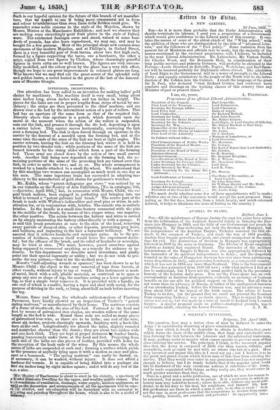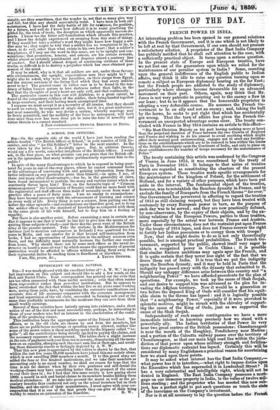A SOLDIER'S INVITATION.
Belgautn, 7th April 1859. The question, how may a better class of men be induced to enter the Army ? is undoubtedly deserving of grave consideration.
The men which it would be desirable to obtain is doubtless that grade which forms the basis of the middle class, that large and undefinable sec- tion forming the link between the labourer and the substantial tradesman. It may, perhaps assist to inquire what causes operate to prevent men of this class entering the service. The principal, I think, is the incorrect popular idea that -the Army is composed of little else than rogues, villains and scoundrels, such as could be met with no where else but in a gaol. How very incorrect and unjust this idea is I need not say ; but I believe it to be the great and grand reason which deters men of this class from entering the service. That they would ever enter in any great numbers I am not sanguine enough to believe, but I do firmly believe that if the popular mind could but be disabused of the very erroneous notions it entertains of the Army, and be made acquainted with things as they really are, they would enter In much greater numbers than they do. Ours is a great and a noble profession, one of which no man has reason to be ashamed, but many reasons to be proud. It is a profession in which an honest man may indeed be honest ; where he is able, without any groat self- denial, to do his duty to his God, his neighbour, and himself, /311, how few iirofessions are there in whisk a man is able to do this so easily Dolt not the ease in most professions that the temptations to deviate from reetia tude, probity, honesty, are constant and powerful ? So appparently irre-
:listable are they sometimes, that the wonder is, not that so many give way and fall, but that any should successfully resist. I have been in both cir- eumatances, I have had the daily battle of life for existence, for position, for a future, and well do I know how difficult it is to resist practising the gilded lie, the trick of trade, the deception on which apparently success de- pends. I know too the bitter self-humiliation which attends this practice, and I know the delight experienced on escaping from this state of things. If they would but take a soldier's word they might know how happy a sol- dier may be ; they might be told that a soldier has no temptation to lie, to cheat, to do evil, other than what exists in his own heart ; that a soldier's temptations, if I may use the word in this sense, are to be upright and con- scientious; that promotion, honour, and esteem, are his certain rewards, whilst almost as certainly punishment and disgrace attend a contrary line of conduct. But I should almost despair of convincing civilians of these truths, so difficult is it to destroy a prejudice which has once obtained pos- session of the mind.
It may be asked, why is it that all soldiers are not, under these favour- able circumstances, the upright, conscientious men they might be ? It might also be asked, why were the Israelites, on their escape from Egypt, not the sincere servants of the living God which they had every induce- ment to be ? The general cause in either case is to be found in the ten- dency of fallen human nature to love darkness rather than light, in the fact that the thoughts of man's heart are only evil, and that continually. The particular causes in this case will doubtless, to a great extent, be found in the compulsory celibacy of the soldier, their being banded together in large numbers, and their having much unemployed time. I suppose we must accept it as a necessity of all armies, that they should to such an extent, be composed of single men, but it is a great misfortune, and most assuredly, he who may devise a system, whereby marriage may be freely permitted, and the mobility of the force be unirupared, will have done more than ever has been done yet to raise the tone of morality and virtue therein to a correct standard.
A NON-COMMISSIONED OFFICER SERVECG vie Dim+.



























 Previous page
Previous page